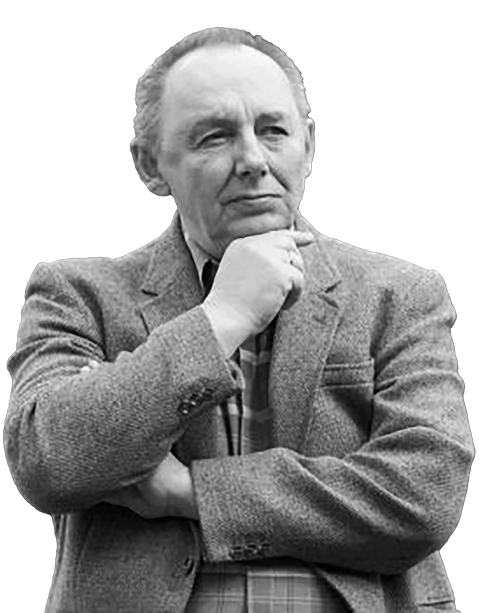Arvydas Šliogeris square
Arvydas Šliogeris (1944–2019)

Arvydas Šliogeris – philosopher, Vilnius University professor, member of the Lithuanian Academy of Sciences, winner of the Lithuanian National Prize for Culture and Arts and of the Lithuanian Science Prize. Architect and prophet of the ideas of the Atgimimas (National Revival) and the Sąjūdis (Reform Movement). Humanist with the belief in the possibility of peaceful coexistence and in the importance of ecology and strong ties of humans with Nature. A person of authority, Honorary Citizen of Panevėžys. Teacher who taught the significance of thinking.
Author and translator of the original works of philosophy, creator of the Lithuanian philosophical language, explorer and promoter of the Lithuanian way of thinking with a strong sense of the importance of poetic language and innermost thoughts and emotions.
Philosopher who has given prominence to experience as an existential pathway of human subsistence, and to seeing as the keystone of thinking. Who has revealed contradictions of being as tensions of life: and the shapes of Nihil are flooded with the light of Presence. Who has realized that the high dome of being is propped up by everyday life, by its metaphysical depth. That the hardest to reach is what is closest. That faith is not to be evaded; in any case a human being must live as if God existed.
Photographer, creator of photosophy, who has deepened the possibilities of visual memory.
Arvydas Šliogeris’ most vital idea is philotopy, which is love for one’s native space, a bond with the place and the things around. The thing is eloquent, things guard Silence, that sanctuary of the soul and creative work. “Language leads us Heavenwards, speechless things Earthwards.” The culture of the sons of the soil is the most universal; the Lithuanian grange is close to the ancient Greek polis. “My ABC-book was Homer,” with these words the philosopher also paid tribute to his father, a teacher of classical languages. His mother was a teacher too.
The square is located on the street where the Šliogeris family house is; here the philosopher to-be was born and grew up, here he walked along Rowan Street to school every day. Oak Street crosses it. You can see these trees, living phenomena, in the square as well – the old survivors and the newly planted. The stone walk is as a dried-up riverbed. The iron ore bench – to sit, to see, to think. The bench is like an architectural metaphor for the horizon, bringing the philosopher’s thought closer: “The entire essence is on this side of the horizon and heaven is near us.”
Thus, the mortal’s hope, to return, comes true.
Prof. Dr. habil. Viktorija Daujotytė-Pakerienė
Arvydas Šliogeris about Panevėžys
“…unfortunately, I’m neither a God, nor a biased ironist, nor an indifferent observer, so when I remember Panevėžys or think of what it means to me “to return to Panevėžys,” my thinking moves from head to heart. There remains no metaphysics, no cogito ergo sum any more. The sole thing remains – my aching heart. Because Panevėžys to me is the greatest, and perhaps the only, loss. To return to Panevėžys means to me, in Proust’s words, to search for lost time. And in a way – to search for the absolute.
We contrive of thousands of absolutes, we mould thousands of idols, but, sadly, at the age of fifty, I’ve realized that I had only one absolute that was dearer to me even than good Lord. And it was that dilapidated town in the plains, crouched beneath the gloomy Northern Sky, the only place and space I can call my home and my native land. Other towns and other latitudes have become for me neither a true refuge, nor even more so a home. Everywhere I felt like a stranger and a guest.
Only Panevėžys once sheltered my peculiar life, domesticated heaven and earth, showed simple but sacred things, from which the warm and elemental secret of being was revealing itself. There I kept company with gods; there I experienced the “pagan” fullness of life. Therefore, I answer: to return to Panevėžys would be for me to return closer to the gods; to touch the things themselves; to escape from the terrible abstractions in which not only my life floats, but also that of many others; to regain confidence in being; to regain form and distinctness; to be again in the space where everything around is clearly seen; to overcome the chaos glittering from the modern world, which is on the brink of madness; to return from the Great Anonym to the irrevocable Here-Now.
My favourite thinker said this: the greatest misfortune of the present man is the loss of the motherland. I agree with him without reservation, because I know I’ve lost Lithuania that I could love, and I’ll never become a full citizen of the world of merchants and computers. But probably I haven’t yet lost Panevėžys, my native land. And my native land is more important to me than the fatherland or the nation. Nation, fatherland – it’s too abstract! Native land is not like that. It’s more important than all statehoods, all world histories, all continents, all the cosmos, and other phantasmagoria. I wouldn’t give a damn for all the “global problems;” I’d give it all for a reed swaying in some backwater of the Nevėžis.”
(Šliogeris A. Konservatoriaus išpažintys (“Confessions of a Conservative”). Vilnius: Pradai, 1995. P. 120–134.)
Translated from Lithuanian by Robertas Beinartas

Honorable mention
The square in memory of Arvydas Šliogeris, for the residents and guests of Panevėžys, has been conceived, funded, and constructed by the company “Metalistas” (Chairman Mantas Gudas).
The architectural solutions of the square were inspired by the creative concept of the project “Itakė” by architect Vladas Balsys, winner of the 2023 ideas competition.
We thank everyone who has contributed to the creation of this space.